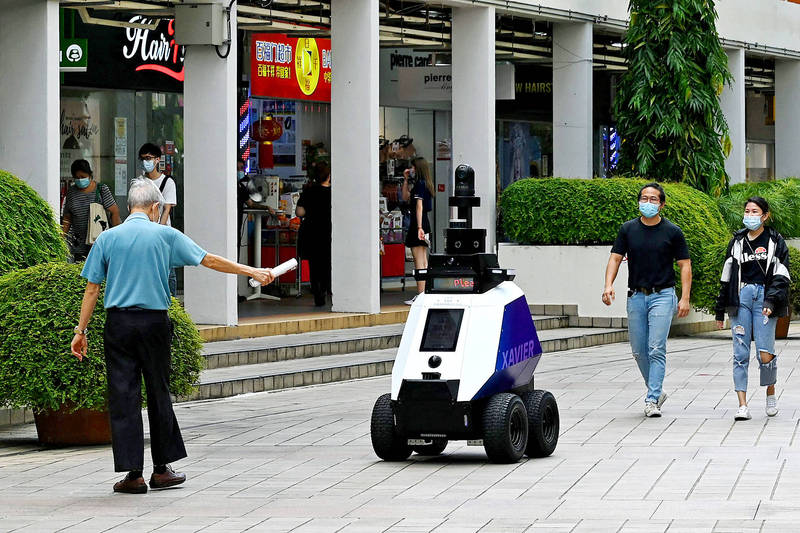《TAIPEI TIMES》 Singapore patrol robots stoke privacy fears

A man gestures at an autonomous robot named Xavier as it patrols a shopping and residential district during a three-week trial in Singapore on Sept. 6. Photo: AFP
/ AFP, SINGAPORE
Singapore has trialled patrol robots that blast warnings at people engaging in “undesirable social behavior,” adding to an arsenal of surveillance technology in the tightly controlled city-state that is fueling privacy concerns.
From vast numbers of closed-circuit television cameras to trials of lampposts kitted out with facial recognition technology, Singapore is seeing an explosion of tools to track its inhabitants.
Officials have long pushed a vision of a hyper-efficient, tech-driven “smart nation,” but activists say privacy is being sacrificed and people have little control over what happens to their data.
Singapore is frequently criticized for curbing civil liberties and people are accustomed to tight controls, but there is still growing unease about intrusive tech.
The government’s latest surveillance devices are robots on wheels, with seven cameras, that detect undesirable behavior. This includes smoking in prohibited areas, improperly parking bicycles and breaching COVID-19 social distancing rules.
During a recent patrol, one of the “Xavier” robots wove its way through a housing estate and stopped in front of a group of elderly residents watching a chess match.
“Please keep 1m distancing, please keep to five persons per group,” a robotic voice blared out, as a camera on top of the machine trained its gaze on them.
During a three-week trial last month, two robots were deployed to patrol the housing estate and a shopping center.
“It reminds me of Robocop,” said Frannie Teo, a 34-year-old research assistant, who was at the mall. “It brings to mind a “dystopian world of robots... I’m just a bit hesitant about that kind of concept.”
Digital rights activist Lee Yi-ting said the devices were the latest way Singaporeans are being watched.
“It all contributes to the sense people ... need to watch what they say and what they do in Singapore to a far greater extent than they would in other countries,” she said.
However, the government defended its use of robots, saying they were not being used to identify or take action against offenders during the trial, and were needed to address a labor crunch as the population ages.
“The workforce is actually shrinking,” said Ong Ka-hing, from the government agency that developed the Xavier robots, adding that they could help reduce the number of officers for foot patrols.
The island of about 5.5 million people has 90,000 police cameras, a number set to double by 2030, and facial recognition technology, which helps authorities pick out faces in a crowd, could be installed on lampposts across the city-state.
There was a rare public backlash this year when authorities admitted that COVID-19 contract-tracing data collected by an official system had been accessed by police. The government later passed legislation to limit its use.
However, critics say laws generally put few limitations on government surveillance, and Singaporeans have little control over what happens to the data collected.
“There are no privacy law constraints on what the government can or cannot do,” said Indulekshmi Rajeswari, a privacy lawyer from Singapore who is based in Germany.
新聞來源:TAIPEI TIMES



















